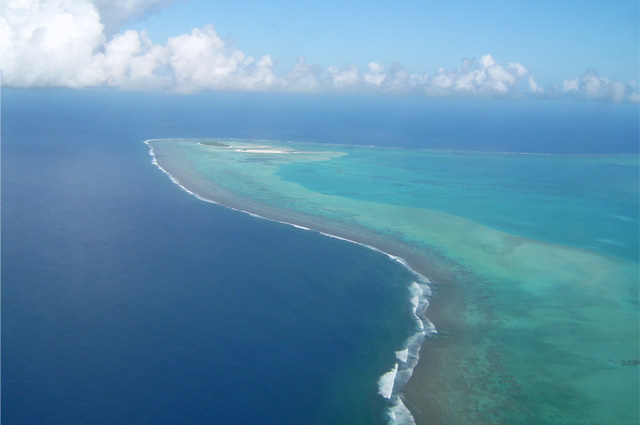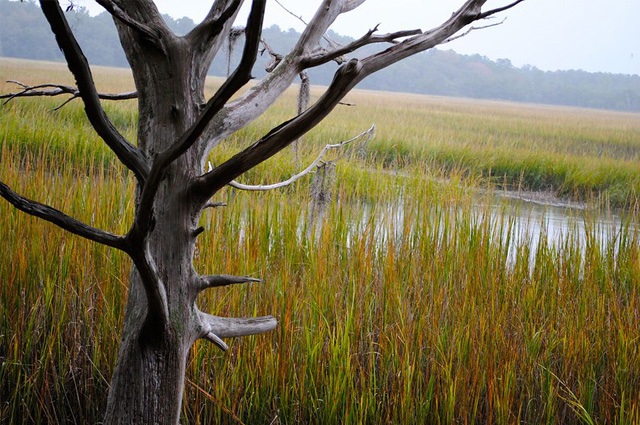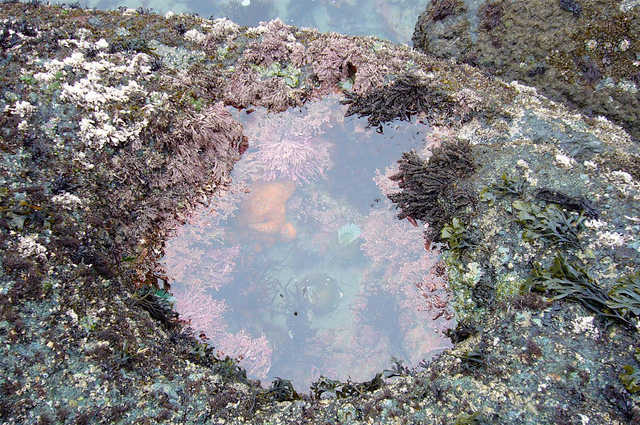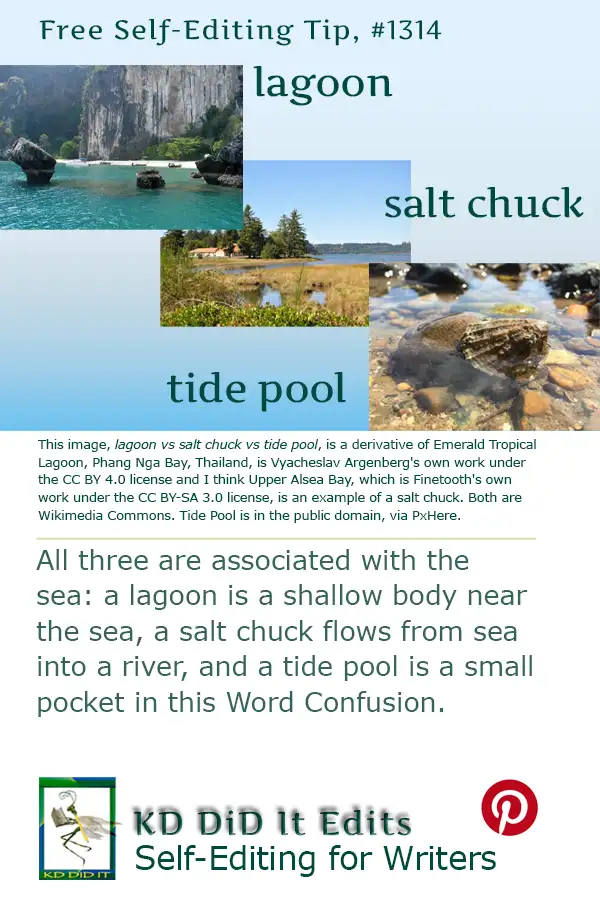This word confusion explores salt water bodies lagoon vs salt chuck vs tide pool.
A lagoon is a busy thing, from a stretch or shallow body of saltwater, a small freshwater lake, or an artificial pool.
A salt chuck is a part of the sea which flows into a lake or river.
A tide pool is a small saltwater pocket revealed along the shore during low tide.
Exploring Later . . .
You may want to explore “Anchorage, Haven, Moorage, and Roadstead“, “Arroyo vs Coulee vs Wadi vs Wash“, “Bay vs Bight vs Cove“, “Bayou vs Bog vs Marsh vs Swamp“, “Beach vs Coast vs Shore“, “Born vs Borne vs Bourn“, “Brook vs Burn vs Draw vs Lick“, “Canal vs Impoundment vs Moat vs Reservoir“, “Cay vs Key vs Quay“, “Channel vs Dyke vs Rill“, “Creak versus Creek“, “Dam versus Damn“, “Delta vs Estuary vs Rapids vs Source“, “Dock vs Pier vs Wharf“, “Firth vs Fjord vs Gulf“, “Harbor vs Marina vs Port vs Quay“, “Lakes: Kettle, Loch, Mere, and Oxbow“, “Ocean versus Sea“, “Peer versus Pier“, “River vs Stream vs Tributary“, “Rivulet vs Runnel vs Sike“, “Sea versus See“, “Slew versus Slough“, and “Straight versus Strait“.
“Chook vs Chock vs Chuck” may also be of interest, in a non-water-related way.
Word Confusions . . .
. . . started as my way of dealing with a professional frustration with properly spelled words that were out of context in manuscripts I was editing as well as books I was reviewing. It evolved into a sharing of information with y’all. I’m hoping you’ll share with us words that have been a bête noire for you from either end.
If you found this post on “Lagoon vs Salt Chuck vs Tide Pool” interesting, consider subscribing to KD Did It, if you’d like to track this post for future updates.
| Lagoon | Salt Chuck | Tide Pool |
|---|---|---|
 — |
 |
 |
| Part of Grammar: | ||
| Noun
Plural: lagoons |
Noun
Plural: salt chucks, saltchucks Alternative spelling: saltchuck |
Noun
Plural: tide pools |
| Noun: A stretch of salt water separated from the sea by a low sandbank or coral reef
|
Noun: [North American; dialect] The sea, or an inlet of the sea, which flows into a lake or river |
Noun: An isolated pocket of seawater found in the ocean’s intertidal zone |
| Examples: | ||
| Noun: Lagoons are often called estuaries, sounds, bays, or even lakes. Lagoons sheltered by sandbars or barrier islands are called coastal lagoons. “The island of Bora Bora, part of French Polynesia in the South Pacific, is surrounded by a lagoon and a thick coral reef” (Evers). Atoll lagoons are at high risk due to climate change and sea level rise. “The Outer Banks are barrier islands along the coast of the US states of North Carolina and Virginia. The Outer Banks create a series of lagoons known as sounds: Currituck Sound, Albemarle Sound, and Pamlico Sound” (Evers). When I was a kid, we used to skate on the lagoon when it froze over. “Farmers often store the wastewater in lagoons and may use it to fertilize crops” (How). |
Noun: “The ultimate consensus was to keep the de-Whited river Green to its Tukwila junction with the Black, the outlet of Lake Washington, then make it Duwamish the rest of the way to the saltchuck” (Manning, p 155). “Trucks disappeared over precipices, rail cars were shunted into the saltchuck, and donkey engines collapsed from old age.” (Keller, p 130). |
Noun: “As ocean water retreats outside the tide pool during low tide, the resident marine life must endure hours exposed to the sun, low oxygen, increasing water temperature, and predators such as wading birds that specialize in dining in these shallow pools” (NOAA). “The space in a tide pool may be limited, but the food there is plentiful” (NOAA). It’s fun to explore a tide pool at low tide as it’s never the same. |
| Derivatives: | ||
| Adjective: lagoonal | Noun: chuck, saltchucker | Noun: rock pool, tidal pool |
| History of the Word: | ||
| Early 17th century from the Italian and the Spanish laguna, from the Latin lacuna, which is from the Latin pool, from lacus meaning lake. | From Chinook Jargon, a language originating as a pidgin trade language in the Pacific Northwest, literally meaning saltwater from salt (from English salt) + chuck (water) from the Nootka č̕aʔak (water), which spread during the 19th century from the lower Columbia River, first to other areas in modern Oregon and Washington, then to British Columbia and parts of Alaska, Northern California, Idaho, and Montana. | The first known use of tide pool was in 1853. |
C’mon, get it out of your system, bitch, whine, moan . . . which words are your pet peeves? Also, please note that I try to be as accurate as I can, but mistakes happen or I miss something. Email me if you find errors, so I can fix them . . . and we’ll all benefit!
Satisfy your curiosity about other Word Confusions on its homepage or more generally explore the index of self-editing posts. You may also want to explore Book Layout & Formatting Ideas, Formatting Tips, Grammar Explanations, Linguistics, Marketing Help & Resources, Publishing Tips, the Properly Punctuated, Writing Ideas and Resources, and Building Your Website.
Resources for Lagoon vs Salt Chuck vs Tide Pool
Some of these links may be affiliate links, and I will earn a small percentage, if you should buy it. It does not affect the price you pay.
Apple Dictionary.com
“Chinook Jargon.” Wikitionary. 1 Sept 2024. Accessed 2 Sept 2024. <https://en.wikipedia.org/wiki/Chinook_Jargon>. Article.
Evers, Jeannie. “Lagoon.” National Geographic. Last updated 19 Oct 2023. Accessed 2 Sept 2024. <https://education.nationalgeographic.org/resource/lagoon/#>. Article.
“How Estrogens Persist in Dairy Wastewater.” Science Daily. University of Illinois at Urbana-Champaign. 5 June 2012. Accessed 2 Sept 2024. <https://www.sciencedaily.com/releases/2012/06/120605113723.htm>. Article.
Keller, Betty and Rosella Leslie. Bright Seas, Pioneer Spirits: A History of the Sunshine Coast. TouchWood Editions, 2011. <https://amzn.to/3yT7Ea7>. Ebook.
Manning, Harvey, Penny Manning, and Ira Spring. Winter Walks and Hikes: Puget Sound, 2nd ed. Mountaineers Books, 2002. <https://amzn.to/3MuzH2M>. Print.
NOAA. “What is a Tide Pool?” National Ocean Service. n.d. Accessed 2 Sept 2024. <https://oceanservice.noaa.gov/facts/tide-pool.html>. Article.
Pinterest Photo Credits
Emerald Tropical Lagoon, Phang Nga Bay, Thailand, is Vyacheslav Argenberg‘s own work under the CC BY 4.0 license and I think Upper Alsea Bay, which is Finetooth‘s own work under the CC BY-SA 3.0 license, is an example of a salt chuck. Both are Wikimedia Commons. Tide Pool is in the public domain, via PxHere.


